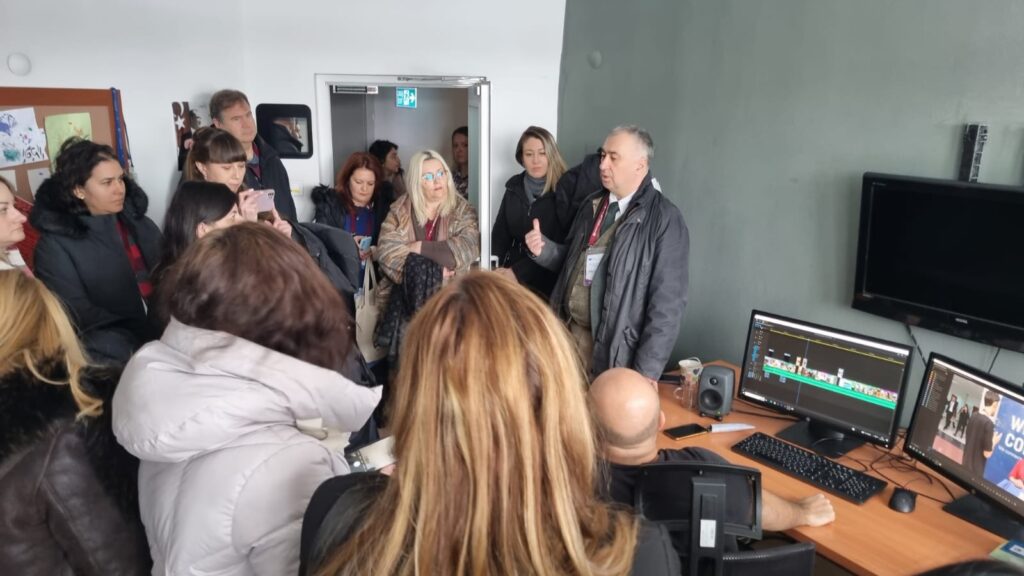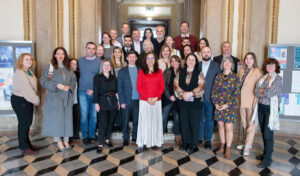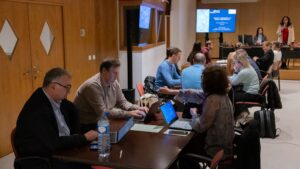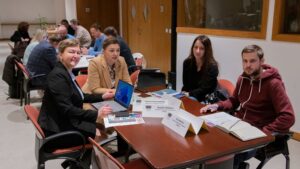To empower teaching and administrative staff from CRED4TEACH partner institutions in Albania, Montenegro, and Ukraine to design, develop, and validate MOOC-based micro-credentials for teacher professional development, European partners have designed and delivered training sessions to selected staff members. Two different training activities have been envisaged:
- Training Towards Becoming a MOOC Designer: Developed by the lead partner, Anadolu University, this training has been delivered to 28 educators from partner higher education institutions in a blended mode. It aims to enable teachers to design and develop open courses, as well as integrate open pedagogies into formal courses.
- Training in the Design and Validation of Micro-Credentials: Led by partner Universidade Aberta, this 3-day face-to-face training has empowered relevant decision-makers from partner institutions (such as Rectors, Vice-Rectors for Quality and Research, Heads of Quality Departments) to develop institutional and national frameworks for introducing micro-credentials. 22 individuals have been attending this activity.
Towards Becoming a MOOC Designer Blended-Training (Anadolu University)
Within the scope of the second work package (WP2) of the CRED4TEACH Project, “Towards Becoming a MOOC Designer” blended training was conducted successfully between November 13, 2023, and February 2, 2024 as a 10 weeks long training. It was designed and implemented by Anadolu University (P4) for faculty members of eight higher education institutions (HEIs) from Albania, Montenegro, and Ukraine. It was targeted to upskill at least 24 educators from partner higher education institutions, and the main goal was to help the participating teachers acquire theoretical and practical knowledge and skills to design and develop a MOOC or MOOC-based course for formal learning and test its effectiveness, efficiency, and attractiveness. At the end of the training, the participants were able to
- Develop a deep understanding about online learning and teaching,
- Discuss the potentials and challenges of integrate technology based and enhanced learning and assessment into their formal learning
- Design a MOOC, or MOOC-based formal learning course
- Produce course content and resources for the MOOC they designed
- Generate plans about integrating MOOC-based micro-credentials into their services
- Share their experiences in the design, development, and implementation of MOOCs in their formal curricula.
The training was designed as a blended MOOC-based training. During the training, the participants completed the first six modules online and came together in class for the 7th module in Eskisehir, Turkiye between 10th and 12th of January 2024. Subsequently, the participants completed three more online modules to complete the training.
Since the targeted teaching staff spread out eight HEIs in three countries, and a large majority of these institutions were located in Ukraine, where the teachers have travel limitations, a blended learning mode was considered as the best alternative to eliminate the limitations of complete online training. MOOC-based training is an instructional delivery strategy in which participants are asked to complete one or more MOOCs with other activities and interactions with the trainer. Since the CRED4TEACH project intended to train the teaching staff on MOOC-based micro-credentials, employing the same strategy in the training to be a model about how to use this strategy in teachers’ professional development was considered an appropriate decision. “MOOC Design and Delivery” is an artifact of an Erasmus+ project (2019-1-DE01-KA203-005051) “Curricular modernization by implementing MOOCs model (MODE IT)” an another MOOC entitled as “Online Proctoring Manager – Self Paced Course” as a part of Erasmus+ project (2020-1-DE01-KA226-HE-005765) “Online Proctoring Manager – Further education program for supporting digital transformation at Higher Education Institutions (PROWIDE)” were used in this blended MOOC-based training.
A total of 59 teachers from different universities participated in the training, and 28 of them participated in face-to-face sessions. They also had the opportunity to visit Anadolu University’s facilities and staff related to the online learning offerings of the university. At the end of the training, 11 MOOCs were created by teams from 8 institutions as a requirement of the training. A total of 48 participants completed all the activities and projects, and received certificates worth three ECTS (90 hours workload). Now, they are expected to create 11 micro-credentials for teachers’ professional development in their countries.
The Anadolu University team coordinator: Professor Cengiz Hakan AYDIN
Training in the Design and Validation of Micro-Credentials (Universidade Aberta)
The Cred4Teach project held an engaging training programme in Lisbon, with 15 institutions from seven European countries to discuss a pressing topic: the professional development of teachers through the conceptualisation and accreditation of micro-credentials. This initiative is particularly focused on improving opportunities for educators in Albania, Montenegro and Ukraine.
The training programme, hosted by Universidade Aberta (UAb) from February 5th to 7th, 2024, included a comprehensive schedule aimed at exploring the potential of micro-credentials to transform teacher professional development. It also served as a platform for fostering collaboration among academic experts and stakeholders from diverse educational contexts.
Day One: setting the scene
The programme began at the historic Palácio Ceia, with a warm welcome from key figures including UAb’s Rector, Professor Carla Padrel, the project coordinator, Professor Sasha Lord and a representative from the Ukraine Embassy. The morning’s discussions set the tone for the event, highlighting the significance of international collaboration in addressing the professional development needs of teachers, particularly in regions facing unique educational challenges.
Following a roundtable discussion that explored participants’ expectations, the afternoon featured a guided tour of the Palácio Ceia, including a visit to UAb’s state-of-the-art recording studio. This activity provided participants with insights into UAb’s technological resources, enhancing the participants understanding of how digital tools can support innovative learning solutions.
Day Two: discussing the contexts and challenges
The second day moved to UAb’s Almirante Barroso campus, focusing on the professional development landscape across Europe. Professors Ana Mouraz and Ana Nobre discussed the challenges faced by primary and secondary teachers, while Professor Isabel Huet addressed higher education teachers’ needs.
The subsequent group discussions offered participants an opportunity to analyse the current scenarios of continuous professional development (CPD) in their respective countries. The dialogue centered on mandatory CPD requirements, the role of higher education institutions in CPD delivery, and how micro-credentials can bridge gaps in teacher development, particularly in Albania, Montenegro and Ukraine.
Afternoon sessions delved into regional perspectives on micro-credentials, with insights from Dr. Alessandra Antonaci of EADTU, Professor Hakan Aydin from Turkey, and Professors Diogo Casa Nova and Sasha Lord, representing Portugal and Germany, respectively. These sessions underscored the diverse strategies for micro-credential accreditation across Europe and beyond.
Day Three: accreditation and future directions
The final day focused on the technical aspects of accreditation. Representatives from Portugal’s Agency for Assessment and Accreditation of Higher Education (A3ES) provided a detailed overview of accreditation processes within Europe and Portugal. This was followed by group discussions where participants worked collaboratively to design templates and frameworks for implementing and accrediting micro-credentials in their own countries.
The day concluded with presentations of group outcomes and a wrap-up session led by Professors Sasha Lord and Ana Mouraz, summarising key insights and paving the way for future steps.
A Collaborative Step Forward
The Cred4Teach training programme was a successul event, equipping participants with the knowledge and tools needed to drive innovation in teacher professional development. By focusing on the accreditation of micro-credentials, the initiative aimed to create sustainable pathways for continuous professional growth, ultimately enhancing educational standards in Albania, Montenegro and Ukraine.
Promotion video on training event in Lisbon
The Portuguese UAb team coordinator: Professor Isabel Huet The UAb team: Professors Glória Bastos, Ana Mouraz, Ana Nobre, Diogo Casa Nova and Dr Ana Paula Coelho













